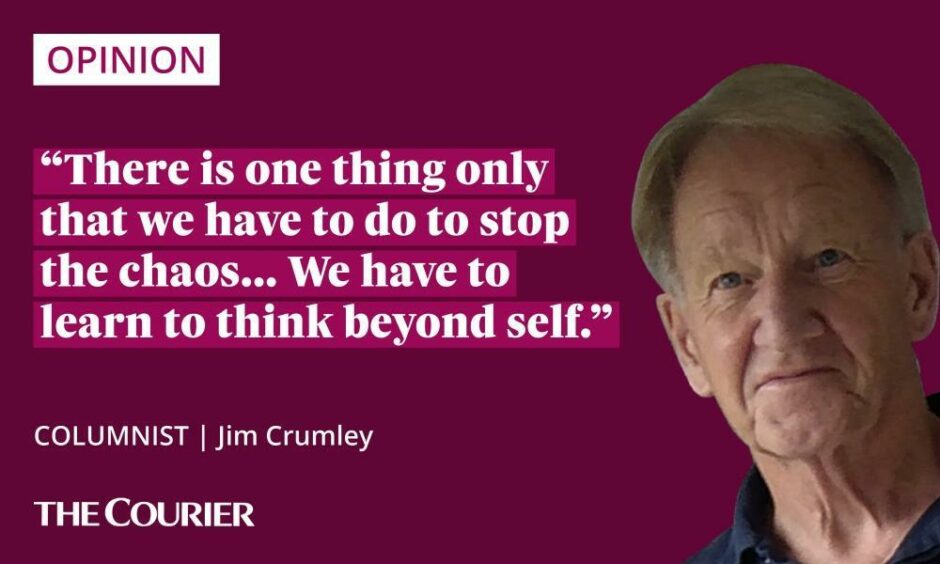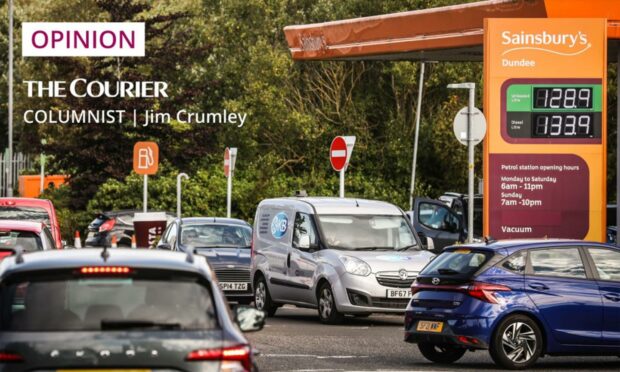One month from now, COP26 will be upon us. And on the basis of how well the great British nation has responded to the petrol supply situation, I don’t hold out much hope for the world.
All we had to do to cope with the wobble in supply to petrol stations was nothing different at all.
It could not have been simpler. Buy petrol as you normally do.
Instead, a fairly hefty percentage of the motorists of the land created hundreds of wholly unnecessary traffic jams, queueing for hours with engines running.
Have you any idea what one such queue does for air quality for miles around? It is less than healthy in a lethal sort of way.

From time to time I am reminded of a traffic information notice in a local petrol station a couple of years ago, one of those variable message things that relayed news about traffic delays on nearby roads.
It laced the messages with occasional snippets of advice. The one I remember was this one (because it happens to be true): “You are not ‘stuck in traffic’ – you ARE traffic.”
I watched the first TV news film clips and listened to people pleading their case and I thought: “You are not ‘stuck in a queue for two hours’ – you ARE the queue.
“Furthermore, there is nothing else you can do that could possibly waste more petrol than what you are doing.”
Petrol chaos casts doubt on COP26 goals
So here is the problem facing COP26.
As our planet picks up speed and increasingly loses control on a one-way journey towards Armageddon, there is one thing and one thing only that we have to do to stop the chaos and it is very, very simple.
We have to learn to think beyond self.
So hands up if you think that, based solely on the evidence of how we turned the petrol supply wobble into a crisis, the world’s political leaders are capable of convincing themselves, each other, and the rest of us, of thinking beyond self.
What are the chances of a latter-day JFK emerging from the host of leaders and crying: “Ask not what your planet can do for you – ask what you can do for your planet”?
The Nobel Peace Prize will be announced just three weeks before world leaders gather for the COP26 climate summit that scientists say could determine the future of the planet. It is one reason why prize watchers say this could be the year of Greta Thunberg https://t.co/p0wLDT4ISK pic.twitter.com/kb82bzvXkB
— Reuters (@Reuters) October 1, 2021
Taken at face value, the petrol queues are but a small symptom.
But the symptom becomes an infinitely more troubling phenomenon when you consider how dependent the world’s human population is on the internal combustion engine and the jet engine and the fossil fuels that keep them on the road and in the air in order to torment the Earth’s atmosphere, melt its ice sheets and glaciers and wreck its oceans and render the planet increasingly uninhabitable.
There should be signposts: Armageddon, straight on.
Armageddon, you may remember, is the final battle between the forces of good and evil in the book of Revelation.
(I didn’t, I had to look it up. My mother would have been appalled. She knew the Bible. She gave me one for my 18th birthday. I had probably asked for a Fender Stratocaster.)
Nature is not immune to climate crisis
The trouble is we think that nature is so reliable.
It keeps turning up when and where we know it should.
📢 NEWS: The #COP26 Green Zone Programme is live!
From 1-12 November, the COP26 Green Zone will be open to the public at the Glasgow Science Centre, both in-person and online, with over 200 events.
This is YOUR chance to get involved at COP 👇#ClimateAction | @gsc1
— COP26 (@COP26) October 1, 2021
Last week, I heard the first pinkfooted geese of the autumn, stopped in my tracks as I always do and found them high over Stirling, on course for Loch Leven.
Autumn is doing what autumn does so well.
We admire, we take pictures, make paintings.
Leaves colour and fall. Swallows slope off for the sun, fieldfares and redwings pour across the North Sea from Scandinavia, eye up the rowan berries.
Stags roar. So do the guns. ‘Tis the season.
But unseen by most of us, floods and droughts and fires and hurricanes intensify and become more frequent, and species by species they obliterate nature.
And much of all this is our fault, because of the way we choose to live our lives.
Because we thirst for petrol and join the queue rather than think about it.
We know what is happening so…
The most telling symptom, the one I read again and again because of its power and its message, is an article by an Iceland writer, Andri Snaer Magnason, who was commissioned to write a eulogy for a glacier.
The glacier is in Iceland, or rather it was.
It died.
“Think about it,” he wrote. “How would you go about that, having grown up with glaciers as a geological given, a symbol of eternity? How do you say goodbye?”
How do you mourn a glacier? Read more about how communities are finding ways to manage rising rates of #ecogrief: https://t.co/YM3NNbMJ4C
— GlacierHub (@GlacierHub) September 24, 2021
Ironically, this one’s Icelandic name was Ok Glacier. The name means “yoke”, as in the pole used to carry buckets of water.
His article ends: “On the copper plate to commemorate Ok glacier, we have written to those loved ones of the future: ‘We know what is happening and what needs to be done. Only you know if we did it’.”
One month to go until the future of the planet descends on Glasgow.
I would have chosen Rannoch Station: a view of the Moor, a tour of the Black Wood, Nicola telling the world, “this is where we will release the wolves…”
